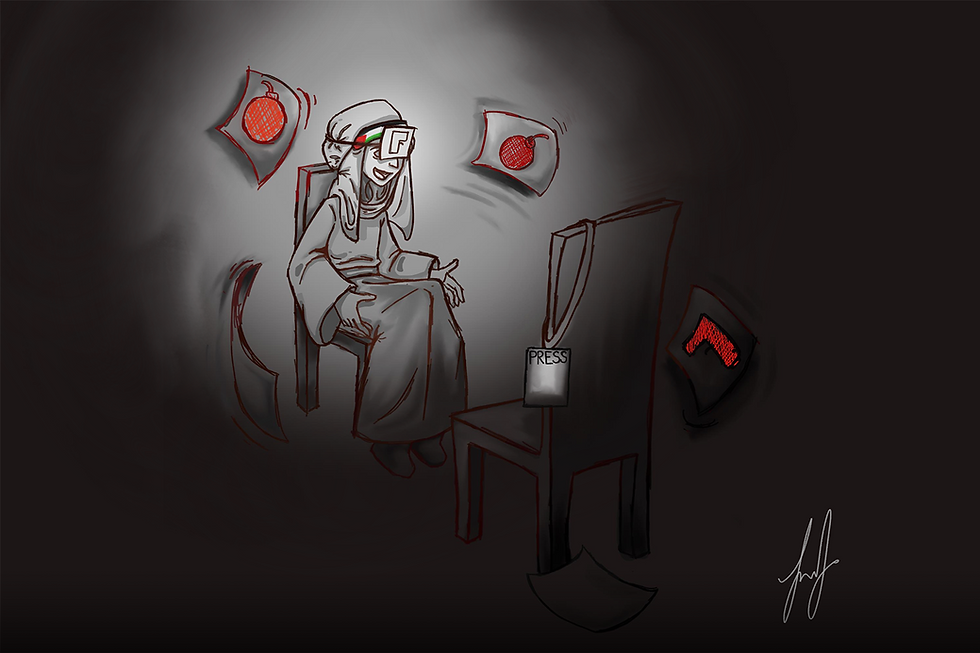SILENCING JOURNALISTS, SILENCING THE WORLD
- The Communicator
- Sep 10, 2025
- 3 min read
A battlefield has always been dangerous for those at war, but for journalists covering Gaza, it has become one of the most perilous and unending conflicts they have faced.

As the eyes and ears of the world, journalists are essential in providing real-time information. Silencing them during war blocks public access to the truth, leaving entire nations vulnerable and unheard.
Since the war began, an estimated 63,000 people have been killed, with the death toll rising daily as strikes continue—among them, dozens of journalists who paid with their lives to tell the world what was happening.
Beyond the bombings, families, including countless children, are also dying of hunger, as the Israeli military blocks the entry of essential goods. The suffering in Gaza is not only measured in lives lost to violence but also in the silent deaths caused by starvation and deprivation.
To make matters worse, Israel has restricted many international media organizations from covering real-time events, leaving Palestinian journalists to shoulder most of the on-the-ground reporting.
This places them in an even more precarious position—working under persistent threat while bearing the disproportionate burden of documenting events that outside reporters cannot consistently observe in real time.
According to press-freedom advocates, these journalists face not only extreme danger but also restrictions and pressures that curtail their ability to inform the world of the realities unfolding in Gaza.
Furthermore, the UN Human Rights Office reported that at least 247 Palestinian journalists have been killed in Gaza since October 7, 2023. This grim toll includes five—Ahmed Abu Aziz, Hussam al-Masri, Mariam Abu Dagga, Mohammed Salama, and Moaz Abu Taha—who were among at least 20 people killed, including four health workers, in a double strike by Israeli forces on Gaza’s largest medical facility.
Israeli Prime Minister Benjamin Netanyahu expressed regret over the killings, describing the incident as a “tragic mishap” and promising a “thorough investigation.” Yet, as UN Human Rights Office spokespersons in Geneva noted, Israeli authorities, as the occupying power, have carried out investigations in the past, often failing to deliver justice or accountability.
In September, nearly 200 media outlets from 50 countries launched a coordinated global action in response to the rising death toll of journalists in Gaza. They demanded an immediate end to the killings and called for international press access to the region. The initiative was jointly organized by Reporters Without Borders (RSF), the global advocacy movement Avaaz, and the International Federation of Journalists (IFJ).
“At the rate at which journalists are being killed in Gaza by the IDF, soon there will be no one left to keep the world informed. This is not only a war on Gaza, it is a war on journalism itself,” said RSF Director General Thibaut Bruttin.
This issue should serve as a wake-up call for people to pay closer attention to what is happening around the world. Journalists are being targeted and defamed for covering the war, yet their role remains crucial in documenting atrocities and providing evidence for international investigations.
Without their work, human rights abuses and war crimes risk going unchecked, while the global flow of information could be disrupted, leading to less reliable and delayed updates. Such a vacuum in credible reporting could further enable disinformation, propaganda, and manipulative narratives to spread unchecked.
This staggering loss is not just a statistic, it is a stark reminder that journalists, who risk everything to uncover the truth, must be protected. They are the eyes and ears of the world. Silencing them is not just an attack on press freedom; it is an attempt to silence the realities of war itself.
And this does not only apply to warzones. In every circumstance, the truth must prevail. Journalism should open public discourse and give a voice to those who need it most. Press freedom must never be suppressed, for the public has the right to know and to have access to information. Silencing journalists is not just censorship — it is the removal of the world’s eyes and ears.
Article: Charmie Cepe
Cartoon: Lara Denise Tinos







Comments